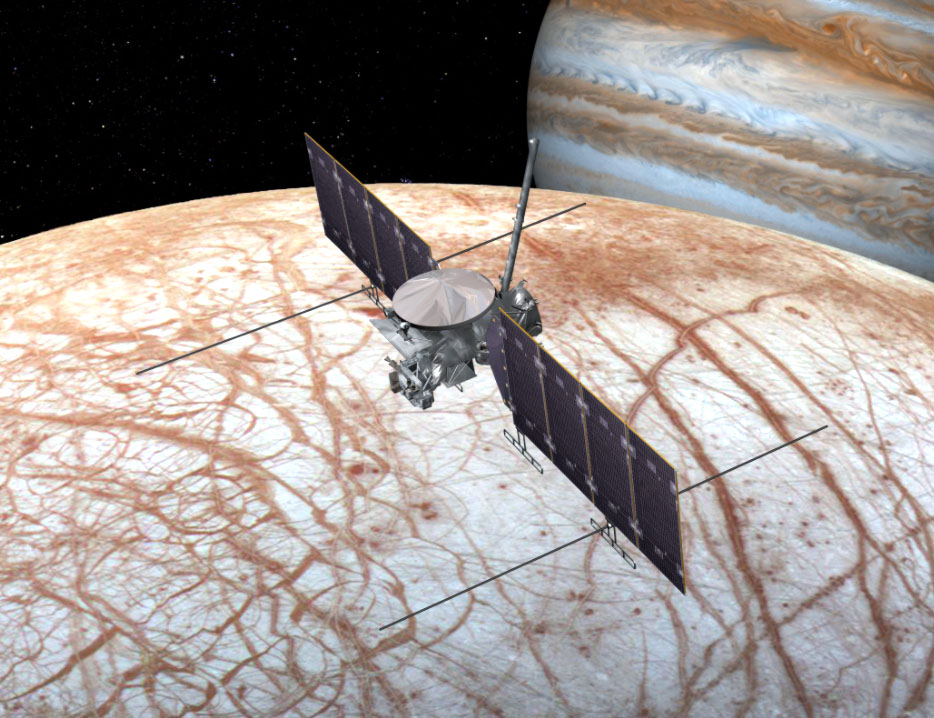Forget Mars, the place we really want to go looking for life is Jupiter’s moon Europa. Dr. Mike Brown, a professor of planetary science at Caltech, explains what he finds so fascinating about this icy moon, and the potential we might find life swimming in its vast oceans.
“I’m Mike Brown, and I’m a professor of planetary astronomy at Caltech. I study anything you can do in the solar system with telescopes, mostly the outer solar system.”
Why Europa?
“I find Europa one of the most fun bodies in the solar system, mostly because if you were just looking around the solar system looking for an object that was interesting in some way, interesting in the sense that it has a lot of liquid water. You would look at the Earth and say, yep, a lot of water there, that’s pretty cool. The next place you would look is Europa – it has the most amount of liquid water of anywhere in the solar system. So it has to be an interesting place, simply by virtue of having that much liquid water. And one of the things I’m most interested in is trying to understand what else is in that ocean besides the water. What is the chemical composition of the salts in that ocean? An understanding the composition leads you to understand things like if the conditions are the types of conditions that might be conducive to life. I’m not going to say that they tell you if there is life or not, but they are the sorts of things that can tell you that it’s chemically rich that life might enjoy or if it’s kind of a sterile environment. And we’ve been learning about the composition of the ocean by looking at the surface of Europa where, in cracks or geysers or some way the ocean gets onto the surface and evaporates, and the salts get out on the surface, and we study those salts to tell what’s there.”
How do we get under the ice?
Exploring underneath the ice of Europa is hard, but one of the nice early steps would be that you can just land on the surface and the surface has stuff from the ocean, so you can just scrape it off the surface and take a taste of it and see what the ocean is like. But if you really want to get down below and swim around in the ocean and explore, and who wouldn’t? In the proposed missions that I’ve heard, and in the only one that seems semi-viable, you land on the surface with basically a big nuclear pile, and you melt your way down through the ice and eventually you get down into the water. Then you set your robotic submarine free and it goes around and swims with the big Europa whales.”
Is there a specific chemical they should be looking for?
It’s hard to imagine that you could find anything even a chemical signature inside the ocean that would really push the idea that there must life under there making it happen, and the reason that it would be hard to find something that would make it so obvious is that we know so little about the core composition of Europa and it’s interaction sea water. And many different things could be going on to cause all sorts of disequilibrium chemistry, and that’s sort of what you’re always looking for – chemical species that shouldn’t be there if everything was just in regular equilibrium. And there’s so many reasons that you might have it on Europa – you have interactions with the core, a strong radiation environment – that it would be very difficult, I think, to come up with a really sound chemical fingerprint that life must exist there.”


A SciFi short? A Europan slug whale rises pursuing a gleaming cloud of radio plankton. The radio plankton have been feeding in the upper ices where radiation from Jupiter’s gigantic magnetic field are strongest. Approaching the end of a blind canyon the slug whale expands into a pancake shape and then envelops the entire swarming cloud of plankton. The ice above is very close to the surface. It’s pure water content allows the slug whale to momentarily see the greater beyond with it’s infrared and RF senses… It ‘sees’ the stars, intones a blessing, swallows it’s prey and performs the ritual dance motions.
Why not? It couldn’t be any worse than the movie “Europa Report”.
We might find a crashed Xul ship called The Singer. (Ian Douglas)
Europa happens to orbit Jupiter at about the same speed as Jupiter orbits the Sun (13.7 and 13.1 km/s). So Europa’s speed relative to the Sun varies between 0 and near Earth’s speed around the Sun. That facilitates a landing.
Even a surface mission should melt (parts of) itself down a few meter into the ice to protects its electronics from the jovian radiation.
I stumbled on a thermal drill development project:
http://www.astrobio.net/exclusive/3463/
Roving on the surface of Europa seems difficult considering the terrain, zoom in on this:
http://europa.seti.org/wp-content/uploads/2013/12/image.jpeg
“All these worlds are yours, except Europa. Attempt no landing there. Use them together. Use them in peace.” -Monolith